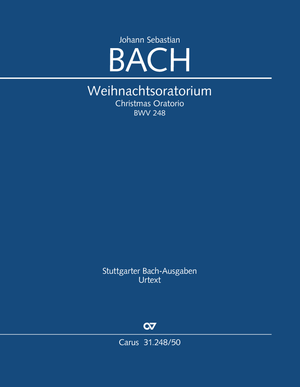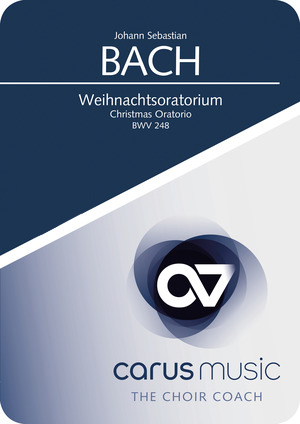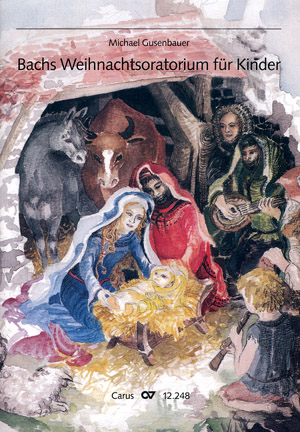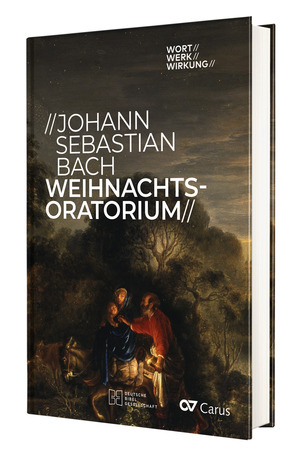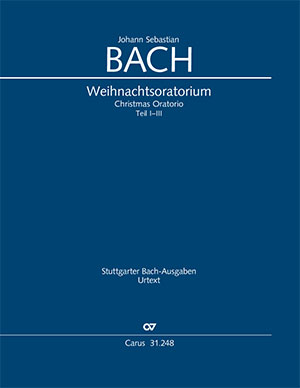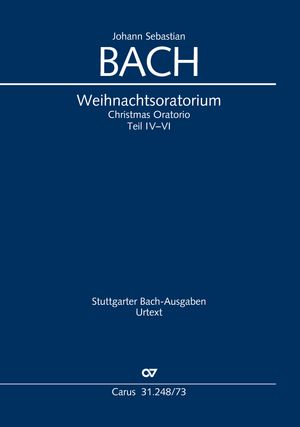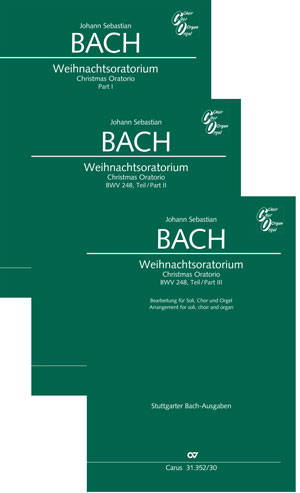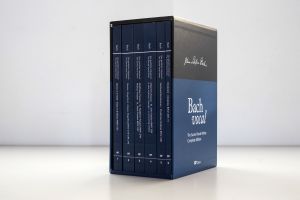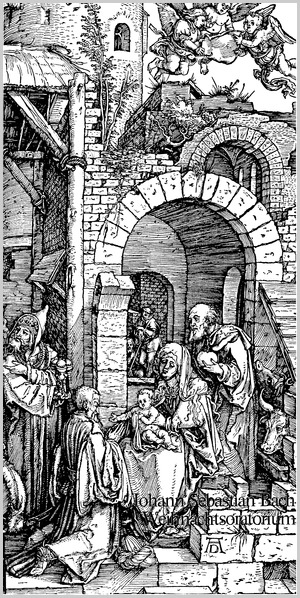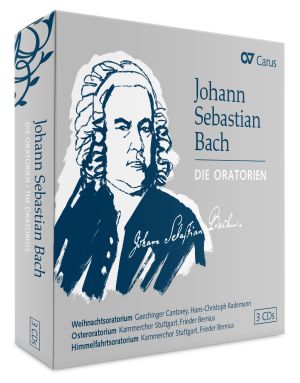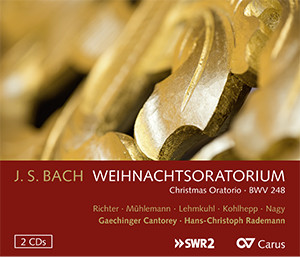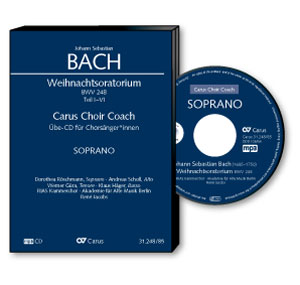
L’Oratorio de Noël est incontestablement le numéro UN du répertoire de Noël des chœurs et très apprécié par le public. L’histoire de Noël d’après le texte biblique selon Luc et Matthieu, associé à des vers libres et quelques strophes de cantiques, avec la musique baroque festive clairement structurée, dégage un rayonnement pictural d’une beauté intemporelle. Pour pouvoir suivre dans les nombreuses coloratures de doubles croches, parfois très rapides, comme «herrlichen Chören» (n°1), «Wohlgefallen« (n°21, Vivace), «Schnauben» des fiers ennemis (n°54), il est fortement recommandé de travailler avec le mode ralenti de l’application.
Le Carus Choir Coach offre aux choristes une aide unique pour apprendre leur voix au sein de la sonorité du chœur et de l’orchestre – seul avec un CD. Pour chaque voix, un CD audio ou MP3 est disponible avec tous les mouvements chantés par le chœur. Le CD se base sur un enregistrement d’interprètes prestigieux, qui ont pour celui-ci utilisé l’édition Urtext de Carus. Chaque mouvement est présenté en trois variantes:
- Version originale
- Coach: la voix sélectionnée est jouée au piano, avec l’enregistrement original en arrière-plan
- Coach en mode ralenti: l'enregistrement comme le coach sont ralentis à environ 70 % du tempo initial, ainsi les passages difficiles peuvent être travaillés efficacement.
Interprètes : Dorothea Röschmann (Sopran), Andreas Scholl (Alt), Werner Güra (Tenor), Klaus Häger (Bass) – RIAS Kammerchor, Akademie für Alte Musik Berlin – René Jacobs
Sommaire
-
Compositeur
Johann Sebastian Bach
| 1685-1750Jean Sébastien Bach compte parmi les compositeurs essentiels de l'histoire de la musique occidentale. Il faisait partie d'une grande dynastie de musiciens, dont furent originaires nombre de musiciens municipaux et d'organistes dans les régions de Thuringe et de Saxe.
Bach vocal
Depuis la fondation des Éditions Carus en 1972, la publication des oeuvres de Johann Sebastian Bach revêt une importance particulière. En 2017, année du 500e anniversaire de la Réforme, nous avons clôturé le projet Bach vocal. L'intégralité de la musique vocale sacrée de Bach est désormais disponible en éditions modernes des textes originaux, matériel d'exécution compris. Une édition globale de toutes les partitions dans un coffret de grande qualité est aussi proposée. Plus d'information sur la personne
-
Ensemble
RIAS Kammerchor
-
Ensemble
Akademie für Alte Musik Berlin
-
Chef d'orchestre
René Jacobs
-
Solist - soprano
Dorothea Röschmann
-
Solist - alto
Andreas Scholl
-
Solist - ténor
Werner Güra
Werner Güra accomplit ses études au Mozarteum de Salzbourg. Il poursuit sa formation vocale auprès de Kurt Widmer à Bâle et Margreet Honig à Amsterdam. Il a été invité à se produire aux opéras de Francfort, Bâle, Dresde, Paris et Bruxelles. On peut l’entendre régulièrement au Staatsoper de Berlin depuis 1999. En qualité d’interprète de concert et d’oratorio, Werner Güra travaille souvent avec des orchestres et des chefs de renom. Des tournées l’ont conduit plusieurs fois au Japon. Werner Güra est aussi un interprète de lied reconnu, ce qu’attestent des prestations pour des organisateurs de concerts internationaux, ainsi que de nombreux enregistrements récompensés de prix aussi prestigieux que le « Diapason d’or ». Plus d'information sur la personne
-
Solist - basse
Klaus Häger
Klaus Häger was born in Wuppertal. After completing his Abitur, he studied music education and later singing with Franz Müller-Heuser, Ingeborg Most and Jürgen Glauß (lied interpretation) in Cologne and Freiburg. He took part in master classes with Sena Jurinac, Ernst Haefliger and Dietrich Fischer-Dieskau. As a student, he gave lieder recitals and performed in orchestral concerts and numerous oratorios, both in Germany and abroad. Klaus Häger’s artistic activities include radio, television and CD recordings. He is a prizewinner of numerous international competitions, including the “Bundeswettbewerb Gesang” in 1990 in Berlin (1st prize in the category “concert” and two special prizes.) Klaus Häger has participated in several festivals, e.?g., the Salzburg Festival, the Schwetzingen Festival and the Schleswig-Holstein Music Festival, and has collaborated with renowned conductors. From 1991–1997, Klaus Häger was a member of the ensemble of the Hamburg State Opera, and from 1998–2003, he was a member of the ensemble of the Berlin State Opera. In 2002, he made his debut at the Bayreuth Festival in Die Meistersinger von Nürnberg under Christian Thielemann. In 2004, Klaus Häger was appointed professor at the Rostock University of Music and Drama. Plus d'information sur la personne
Questions fréquentes sur l'œuvre
 Il n'y a pas encore de questions et réponses concernant cette œuvre ou vous n'avez pas trouvé la réponse à votre question sur l'œuvre ? Cliquez ici et envoyez votre question spécifique à notre service clients.
Il n'y a pas encore de questions et réponses concernant cette œuvre ou vous n'avez pas trouvé la réponse à votre question sur l'œuvre ? Cliquez ici et envoyez votre question spécifique à notre service clients.


